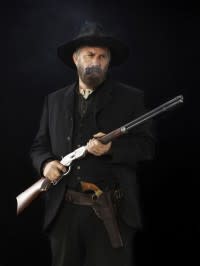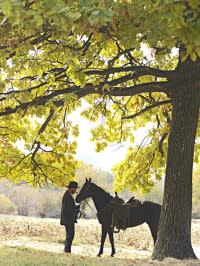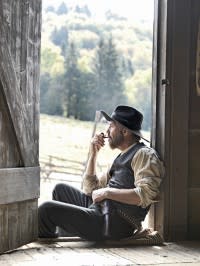EMMYS: Kevin Costner On ‘Hatfields & McCoys’
Anthony D’Alessandro is AwardsLine managing editor and contributor.
When it comes to the longevity of the Western, Kevin Costner remains an iconic voice for the genre. This time he’s extended his lasso around TV as the producer and star of History Channel’s first miniseries Hatfields & McCoys. Hitting record ratings for basic cable each of its three nights with a final 14.3 million, Hatfields’ success underscored the genre’s continuing popularity as well as Costner’s continuing potential as leading man. Costner Westerns hone in on the subtext and mores of standoffs against a blue sky, which are plentiful in Hatfields, rather than slow-motion blood and pungent dialogue that have peppered the likes of the Coen brothers’ True Grit and HBO’s Deadwood. Costner also doesn’t flinch at playing the bad guy, and his Devil Anse Hatfield is as potent as his turns in A Perfect World and Mr. Brooks. Given the TV Academy’s adoration for oaters (i.e., the four Emmy wins rallied by Robert Duvall’s Broken Trail including best actor and miniseries), expect Costner and Hatfields & McCoys to ride high in the saddle come nom time.
AWARDSLINE: How did the project come your way? Were you tracking this?
KEVIN COSTNER: No, It came to me in a fairly traditional way. My agent had read it, knowing my sensibilities. While on the surface it didn’t seem like something I would do in terms of it being on TV — whatever everyone’s prejudice is — he understood I’m writer-driven and material-driven. He liked it enough that he asked me to read it and when I did, I knew immediately that I liked it enough to consider it. They asked me to direct it, but I was doing music over the summer and I couldn’t give it its proper prep.
Related: EMMYS: ‘Hatfields & McCoys’ Producer Leslie Greif
AWARDSLINE: Did you have a particular choice in terms of what part you wanted to play — Devil Anse Hatfield or Randall McCoy? What drew you to Devil?
COSTNER: I had my choice in terms of what I wanted to play. I thought about playing Jim Vance. Loved that role and I liked “Bad” Frank but it made more sense for me to play Devil Anse. I had to put my producer’s hat on at that moment: What was the right place for me to be? Not ‘How can I surprise people.’ It was really more “I should take Devil Anse.” That made the most sense and, I got involved in this as any role I ever had … I don’t think we tried to paint [Hatfield or McCoy] more right than the other. I think we tried to show their personalities. Devil showed a willingness to work this out, but in terms of fierceness and harness he was unflinching.
AWARDSLINE: From a dramatic perspective, is Devil close to any of the Western characters you’ve previously played? Such as Wyatt Earp?
COSTNER: I think so. They’re direct people and have succeeded in their own hard times because of their ability to react quickly and to decide in a moment what has to be done. Devil came out of war, so he has seen a lot of death and hand-to-hand combat. There were people in the West that were very decisive and they were hard in how they were guided. People fell in behind them. Both Wyatt Earp and Devil Anse weren’t the oldest in their families, yet everyone acquiesced to them.
AWARDSLINE: Is it easier to make Westerns right now, given the recent success of True Grit?
COSTNER: The success of True Grit doesn’t guide me. I’ve always gone my own way and made them. I don’t know if they’re in vogue. I make them because I want to make them, not because the timing is right for them. They’re hard to make, and maybe hard to get people to make them, but hard to make in terms of making them relevant. The only way to make them relevant is if you actually depict real situations and find a way to do it with dramatic and entertaining value. When they’re just black and white hat, they don’t hold value to me … We don’t need to see slow motion blood. It can’t just be gritty for grit’s sake. Some people were very clean and others lived a life in a saddle during that time … Audiences trust Westerns when you hit the right tone. I think they’re not in vogue, but they will always be in vogue when you hit the right note.
AWARDSLINE: Why was Kevin Reynolds an easy-go after you passed on directing?
COSTNER: He was my idea. They had a list of people and I felt Kevin would work for great locations, a great style and bring a film sensibility to it. We didn’t have the kind of money that was being thrown around like other miniseries on HBO. We were a third of those budgets. But I know us as guys who don’t settle. I felt that was a way for us to elevate an already great story.
AWARDSLINE: What is it about Kevin Reynolds as a director that brings the best of you as an actor?
COSTNER: I just think he would bring a great vision. It doesn’t necessarily bring out the best in me. There’s a lot of great directors and I thought Kevin could be great for this. It wasn’t going to be an easy show. I like people who are aware of that and that doesn’t cause them to wilt … Kevin shot some second unit for me on Dances With Wolves with the buffalo scenes. I had seven cameras going. I did the same for him on Hatfields.
AWARDSLINE: So, then the whole Waterworld production debacle was blown out of proportion?
COSTNER: Waterworld was certainly blown out of proportion. You can tell I don’t look backwards. I’ve always supported him. I have my own voice, and I think he’s an absolute artist and I’ve been the biggest fan of his work. You can see how I behaved … I was impressed early and impressed late [by his capabilities as a filmmaker]. I put him in a category of all these guys who are thought to be great. He’s not on those movies because I think people blew Waterworld out of proportion. He’s as good as any of these guys that are making these big movies. I know that in my heart.
AWARDSLINE: You’ve been involved in Westerns since very early on in your career. What do you love about the genre?
COSTNER: I think it’s hard for people to suspend the era they live in and understand the decisions that had to be made often during the western [frontier era] were life and death. You had to be resourceful and on your feet to try to figure out somebody. You didn’t have the benefit of knowing who somebody was. And when you use a word like “stranger” – “stranger” is a word that doesn’t really scare us anymore. When someone would come into town back then, you could be afraid of a stranger. You don’t know what side they fought on in the Civil War. You don’t know their story. People would victimize people in the West, could do that in every town and then move on. There was no way to communicating that there was a bad person. We did it to the Indians across the entire continent. Sometimes in the dark, I wonder if I would measure up, would have reacted in the right way or if my civility would have gotten me killed because you had to have a hardness. So when someone had a hardness or directness like Devil Anse; when he kills that young boy in the road, it speaks to his sensibility of survival, not that that young boy was threatening him, but because his uncle killed the other one … “If that was my friend or if that was my brother who was just killed, and these guys let me live, I’m going to come back there and find these guys and I’m going to fucking kill them.” Devil understood that’s what was possible. And so he didn’t like killing that boy. And the best he could do is let them think that he wasn’t going to kill him, but he did. It speaks to hardness. Some people reject that and I’m drawn to it. Not as a person, that I would want to do that. I don’t reject him as a person because he did that. I reject the other guy completely: Jim Vance as a sociopath.
AWARDSLINE: In part two where Randall McCoy begs for your mercy to release his sons – your character just won’t yield.
COSTNER: No. I think it was written correctly. Randall did the right thing: He came unarmed and he put himself at Devil’s mercy. The best my character could offer him: I offered him some wriggle room — if my brother lives, then your boys go to court. That was a concession if you think about it … These people (the Hatfields and McCoys) often handled their own problems. They arbitrated their own situations. There’s a little concession there. But the idea that Devil said “No” — I respond to that human behavior, I get it. Randall asked two or three different ways and that’s the point Devil was trying to make: “No.” He was a hard guy. But I think you understood him. Do you let somebody go that stabbed your brother 27 times and shot him at a county fair? Do you let those three boys go free from your garage? … I mean if you think really about it. I don’t think you do in that day and time. Today, the police would come in and intervene.
AWARDSLINE: Dropping out of Quentin Tarantino’s Western Django Unchained – was that really a matter of the scheduling? [Editor’s note: Costner was slotted to play Ace Woody, a nefarious, sadistic trainer of male fighting slaves who entertain the white patrons at a hellhole.]
COSTNER: It was completely a matter of schedule. When we were first talking about it, it was about a two-week commitment. That’s the schedule that they thought they were going to shoot. I’m guessing now about this part — but as other actors came on the project, their schedules were such that it started to change schedules. When I looked at my part, I was stretched across two or three months and I could not do that. I had musical commitments (with Modern West).
AWARDSLINE: You’re often branded as playing the good guy, but I have to think you have no qualms playing the villain. In fact you did in Clint Eastwood’s A Perfect World. Do you care if you’re the villain?
COSTNER: No. I also played a serial killer in 2007’s Mr. Brooks before Dexter. That’s as heinous as it gets. You’re right I don’t have a problem playing a part like that. I don’t at all. But I have to find a level of understanding in those characters. If I do that, then I feel like I’m on solid ground. You don’t have to like Devil Anse, but it’s important that I play him to the degree that if you’re watching really carefully and you want to try to put yourself in his time and era, you’ll find a level of understanding in his behavior.
Related stories
EMMYS: ‘Hatfields & McCoys’ Producer Leslie Greif
EMMYS: Mike Fleming’s Q&A With ‘Boardwalk Empire’ Creator Terence Winter
Get more from Deadline.com: Follow us on Twitter, Facebook, Newsletter






